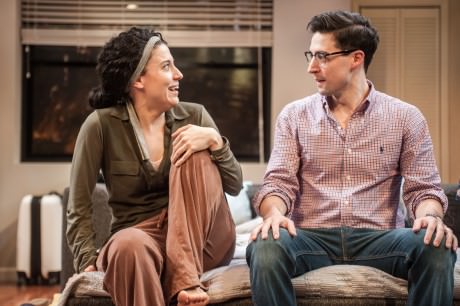Bad Jews beggars genre naming. “Comedy of ideas” doesn’t hold a Shabbat candle to it. Bad Jews is so over-the-top funny, so razor-sharp smart, and so plumb-the-depths profound that it left me gobsmacked in utter awe. Written by Joshua Harmon when he was just 24, and now playing at The Studio Theatre only until December 21st, Bad Jews is a perfectly polished gem—a don’t-miss gift of exceptional theater whichever holiday you observe (or don’t).

The setting is a studio apartment on Manhattan’s Upper West Side. The four characters are all millennials. Three are the grandchildren of a Holocaust survivor named Poppy, whose funeral was that day; the fourth is a goyish girlfriend. The show’s form is fast-paced sitcom. At first it plays like a Friends script, and Serge Seiden directs with hilarious panache.
And then an argument emerges. It’s a conflict between Daphna (the firecracker Irene Sofia Lucio), a devout and observant Jew, and her cousin Liam (the volatile Alex Mandell), who is unapologetically lapsed and antipathetic to the faith. The point of their contention is a mega MacGuffin: Who should inherit Poppy’s cherished chai, a sacred gold charm with a significance and history that Daphna reveres and Liam reviles. This family fissure is the fuse that sets off a megafun explosion.
Jonah, Daphna’s cousin and Liam’s brother, is a gamer slacker and a reluctant spectator to the spat. It’s his apartment, paid for by his well-off folks; and three sleeping areas, a pull-out sofa and two inflated air mattress, were meant to welcome Daphna and Liam. But Jonah (the still-waters-run-deep Joe Paulik) does not want to be involved in their dispute much less referee.
Liam arrives from a ski trip (so he has missed Poppy’s funeral) with Melody, a pretty blonde WASP who finds herself thrust into a religious hornet’s nest. She seems a bit dim at first, a typical airhead ingenue, but in Maggie Erwin’s spitfire performance, Melody’s surprising character arc becomes a dazzling stroke of brilliance. Just when the fray could not be more fraught with anger, the sweet-tempered Melody, an opera singer manqué, offers to sing a song to calm things down. Erwin’s ensuing off-key rendition of “Summertime” from Porgy and Bess had the audience in stitches and nearly stopped the show.
Set Designer Luciana Stecconi’s earth-tone simplicity and Lighting Designer Daniel MacLean Wagner’s easy ambiance fit the situation just right. Sound Designer Palmer Hefferan’s musical intro and outro evoke Jewish cultural past and millennial present. And Costume Designer Kelsey Hunt makes spot-on character-specific choices—including a pink parka worn by Melody.
When the play turns serious (as it does intermittently), Harmon gives his characters some of the most trenchant and well-wrought speeches I can recall in any contemporary play. The counterposing views of Daphna and Liam are expounded with both gravitas and wit. Liam slams the scriptural cherry-picking required to make Jewish tradition “palatable for your 21st century sensibilities.” He cites in particular biblical passages with anti-female animus, more to rile Daphne than out of any pro-woman sympathies (the guy can hurl misogynist invective with the worst of them).
I can’t get worked up about preserving a totally watered-down version of something that wasn’t even true to begin with, and I’m not going to allow it to dictate how I live my life or who I choose to live my life with so I can genetically or biologically pass on something I don’t believe in.

With equal eloquence Daphne gives voice to the essential values at the core of honoring Jewish tradition:
If I stop, if we all stop, it will be gone. And you can’t get it back. Once it’s gone, it’s gone.
The playwright presents each view in stark contrast but in stirring equipoise. As we weigh Liam’s and Daphne’s words, we realize Harmon’s thumb is not on the scale. And his command of character-driven ideological conflict makes this comedy-drama a powerfully engaging experience.
The title is a jokey echo of a self-deprecating jest common among nonobservant Jews; but among devout Jews, the title can also seem off-putting and a provocation. Wherever one falls on that continuum of culture and creed (and even if, like me, your ancestors were never met with anti-Semitism), Harmon’s ending will astonish and move you beyond what anyone could possibly expect. I will give nothing away except to say that Jonah, about whom we learn little during the play (compared with the other three characters, he’s kind of a cipher), is revealed in such a true and touching way that all laughter stills—and only the heartbeat of great art can be heard.
Running Time: 90 minutes, with no intermission.
Bad Jews plays through December 21, 2014 at The Studio Theatre’s Mead Theatre-1501 14th Street, NW, in Washington, DC. For tickets call (202) 332-3300, or purchase them online.





